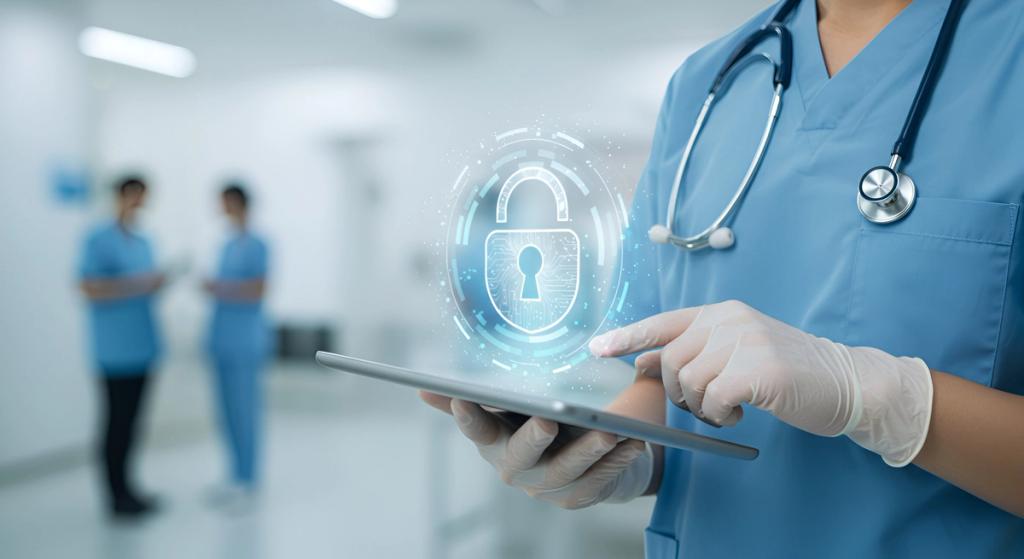
Company Blog
Healthcare Phones: The #1 Target in Today’s Cyber War
In the digital arms race of modern cybercrime, healthcare is on the front lines, and the battlefield is mobile. Phones used by doctors, nurses, administrators, and support staff are now the #1 target in today’s cyber war. The reason? These devices carry unprecedented volumes of sensitive data, often on unsecured apps, in environments with minimal oversight.
A recent healthcare phone breach involving TeleMessage (a subsidiary of Smarsh), a platform used for archiving mobile communications in regulated industries, exposed how vulnerable even “compliant” tools can be when mobile governance is weak. Early reports point to misconfigured access controls and lack of segmentation — all avoidable with stronger safeguards.
But this breach isn’t isolated. It’s the latest in a growing pattern of attacks targeting healthcare mobile security.
Why Healthcare Phones Are Prime Targets
Healthcare workers rely on their mobile devices to:
- Share patient information quickly
- Coordinate with other care team members
- Communicate with patients and family members
- Access scheduling, prescriptions, and lab results
In many cases, these communications are happening on personal phones, using unencrypted SMS, unaudited apps, and non-compliant calling platforms. That’s a perfect storm of vulnerability for mobile threats in healthcare.
Here’s why these devices are so appealing to attackers:
1. Bring Your Own Device (BYOD) Culture
Most healthcare systems allow or encourage staff to use personal smartphones at work. Without a secure infrastructure, this creates serious risks for HIPAA compliant mobile communications. Patient data often flows through unsecured, consumer-grade messaging tools with no oversight.
2. Lack of User Training
Even in major hospital systems, many staff members are unaware of mobile communication risks. Clicking a malicious link, sharing credentials, or using public Wi-Fi may seem harmless, until it results in a healthcare phone breach.
3. Messaging Apps & Shadow IT
From iMessage to WhatsApp, many clinicians use apps that are invisible to IT and non-compliant with HIPAA. These platforms offer no guarantees of secure healthcare communications or access controls.
4. Weak or Nonexistent Encryption
Traditional voice and SMS services used by carriers don’t offer encryption, making them easy to intercept. If a phone is lost, stolen, or compromised, sensitive data is instantly at risk, violating healthcare mobile security standards.
How Cybercriminals Exploit the Gap
Healthcare is a goldmine for attackers. Threat actors increasingly target mobile endpoints with:
- Phishing messages disguised as appointment reminders or urgent staff notices
- Malicious apps that quietly record SMS and voice data
- Unsecured Wi-Fi traps used to hijack sessions and data
- SIM swapping to hijack a healthcare worker’s mobile identity
These vectors exploit exactly what mobile communications in healthcare often lack: encryption, segmentation, and monitoring.
Why Most Mobile “Solutions” Still Leave You Exposed
Enterprise Mobility Management (EMM) and Mobile Device Management (MDM) tools protect the device, but not necessarily the data or conversation. Even archiving platforms like TeleMessage, as seen in the recent healthcare phone breach, can become vulnerable if APIs or session tokens are misconfigured.
The real issue? These tools often fail to deliver truly encrypted healthcare messaging and control over the communication channel itself.
How MultiLine Protects Healthcare Mobile Communications
That’s where Movius MultiLine, deployed by Premier Wireless, steps in. MultiLine is built for environments like healthcare where mobile threats are constant, and HIPAA compliant mobile communications are non-negotiable. It’s carrier-grade, end-to-end encrypted and trusted by the Department of Defense, top healthcare systems, federal agencies and leading financial institutions.
Why MultiLine is built for healthcare mobile security:
✔️ HIPAA-compliant mobile communications
✔️ End-to-end encryption (in transit + at rest) for secure healthcare communications
✔️ Secure voice, text, and messaging app capture for audit-ready records
✔️ True separation of business and personal communication to reduce risk
✔️ Instantly deployable — no second phone required for healthcare professionals
✔️ Scales easily from 100 to 10,000+ users with minimal IT burden
Why Healthcare Providers Trust Premier Wireless
At Premier Wireless, we understand the high stakes of healthcare mobile security. That’s why we specialize in equipping hospitals, clinics, and home health providers with modern, HIPAA-compliant mobile communication tools that keep sensitive data safe and operations efficient.
By deploying Movius’ MultiLine, we can bring you a secure, scalable solution tailored for the unique demands of healthcare. From strategic planning to hands-on deployment, we provide the expertise and support your organization needs to ensure encrypted healthcare messaging and secure mobile communications.
Let’s protect your patients, your staff, and your future.
Contact Premier Wireless today to start securing your mobile communications, before the next breach makes headlines.